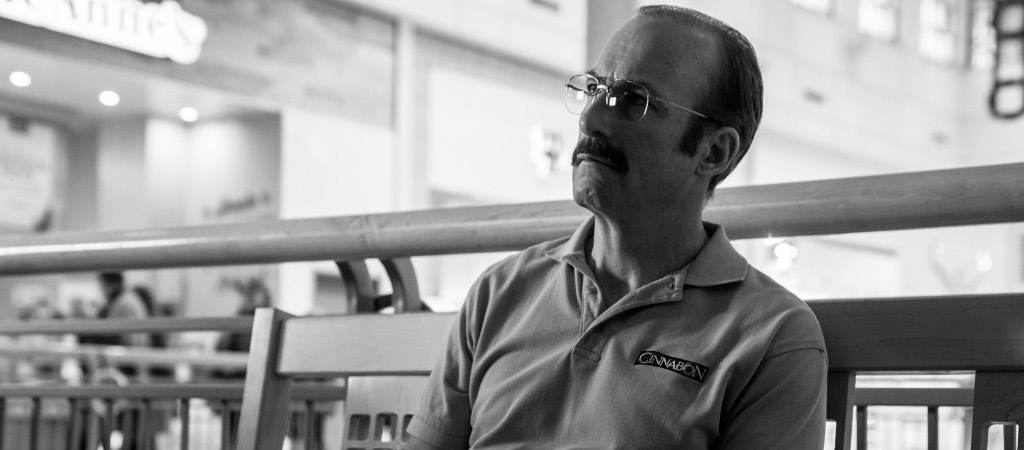Better Call Saul knows exactly how to deliver the completely unexpected in a way that also feels like it was the only way forward. Just as the series accelerated its pace in the past few episodes, it took a step forward in time and slowed down a bit. Season six, episode ten, “Nippy,” the fourth to last episode of the series, shifts the setting even more forward in time than where the last episode ended to Omaha, Nebraska, following Gene Takovic, the mustachioed persona of Jimmy McGill/Saul Goodman takes on following the events of Breaking Bad. Gene, whom we’ve gotten glimpses of throughout the series, is lonely in his new, isolated life. The black and white photography adds to the bleak and lifeless mood, making even Cinnabon less appealing than usual. All of the brief moments we’ve had with Gene over the years have led to this.
The episode takes classic elements that defined Better Call Saul’s earlier seasons, which differentiated it from Breaking Bad and places it entirely in Gene’s black and white world. Like earlier episodes, “Nippy” is a generally self-contained episode in terms of its storyline, with memorable side characters we’ll likely never see again. The incomparable Carol Burnett plays Marion, an old woman Gene schmoozes with an ulterior motive: she is the mother of Jeff, the cab driver who recognizes him as Saul Goodman. His intentions are twisted, but Marion brings out the best of Jimmy’s skills, the charm that made us fall in love with the character so quickly despite his certain future. Jimmy has taken advantage of old people but at the same time has a natural, well-meaning rapport with them as he does with Marion. For some reason, they seem to bring out the real Jimmy McGill, even when he’s performing. Parks and Recreation’s Jim O’Heir fits seamlessly into the Better Call Saul universe as Frank, the security guard who takes three entire minutes to eat a cinnamon roll. Like so many characters who came on the show before him to represent citizens of Albuquerque who were ignorant of the plot, Frank, a guy so normal he cannot even say he has ever felt sad, is intertwined in one of Slippin’ Jimmy’s cons.
From the beginning, Better Call Saul established that it loves nothing more than a montage. Its montages often focus on mundane tasks and repetition, such as Gene closing the Cinnabon every night, then following him as he takes out the trash and travels through the deserted mall to bring cinnamon rolls to the security guards, all as a part of an elaborate scheme to plan the perfect robbery — it’s quintessential Better Call Saul. “Nippy” uses the montage to communicate the banality of Gene’s existence. At a certain point, you start to feel his frustration. He needed to do something to feel alive again, to feel a sense of purpose. Even though you know it’s bad for him, and will likely lead to his downfall, you’re rooting for him once again.
“Nippy” lets the audience exhale after a couple of intense episodes that forced us to hold our breath, waiting for the worst (and getting it). My awareness of the episode being one of the final episodes of Better Call Saul instilled anxiety in me that something terrible would happen at any time even though this was, save for a moment, a standard episode of the series. Even though it’s so classic Better Call Saul to its core, the awareness of the endgame hovers over you. At any point, it feels like someone from Jimmy/Saul’s past could come to haunt him.
The episode proves it’s essential to the final stretch when Jimmy’s plan goes awry. Jeff slips on the floor of the department store and hits his head, and lays on the floor unconscious in front of the security camera. Jimmy has to save his ass. Thankfully, he has done this many times and under many different personas: Jimmy, Saul, and now Gene. Jimmy’s feigned sadness over the emptiness of his life is more distraction than confession but is the closest the character has ever gotten to being real outside of his relationship with Kim Wexler. Jimmy tells Frank that his parents are gone. His brother is dead, and he has no wife. He obviously leaves out the part where he did have a wife who left him, but he’s not ready to confront that yet. That will hopefully be in an episode to come.
While “Nippy” was built around a pivotal emotional moment for Jimmy McGill, it felt like an early episode of Better Call Saul: a contained story with quirky supporting characters and most importantly, a little con. Slippin’ Jimmy as we knew him in the show’s earlier seasons and before Kim left him was lurking beneath the surface, and he just had to come out for one last classic con.







